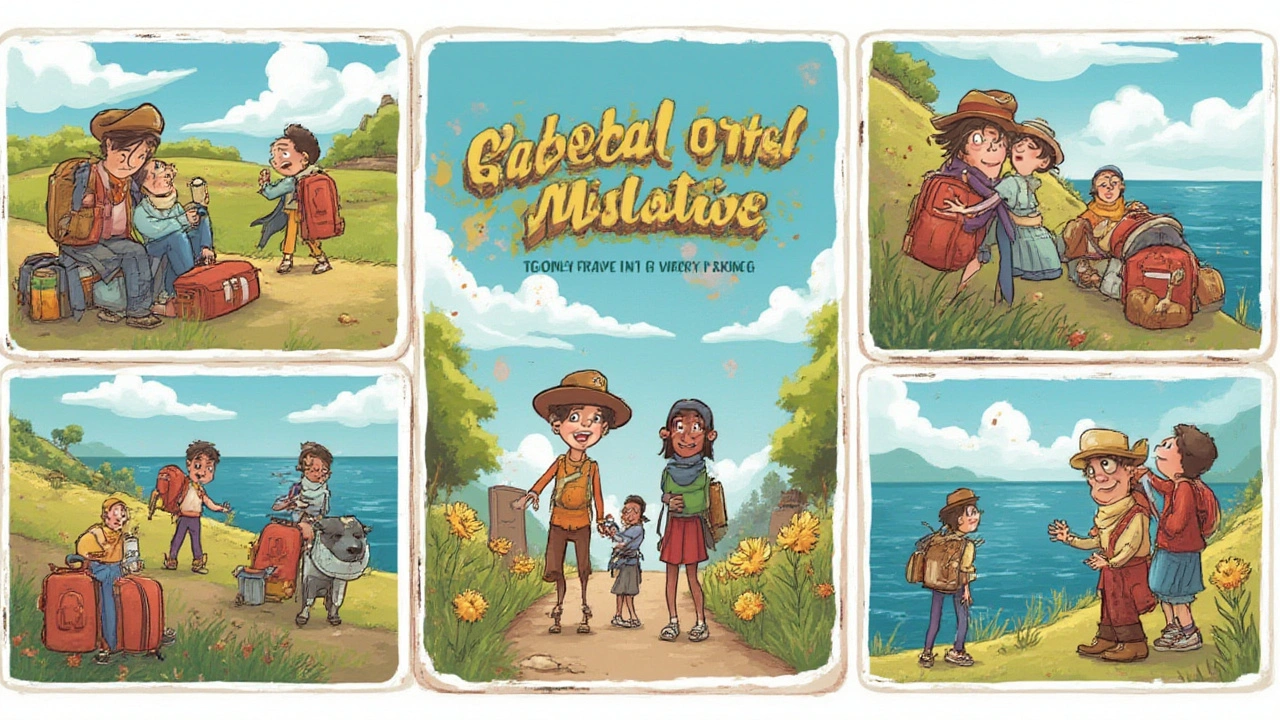Best Tips for Finding the Ideal Travel Companion in 2025

Ever noticed how a dream trip can quickly turn into a hassle when you pick the wrong person to go with you? The right travel companion changes everything. They help keep the mood up when travel schedules get messy, split the costs, and even make airport delays fun. The wrong choice can derail plans, create conflict, or even end friendships. This article walks you through what makes an ideal travel companion and how to find one, even if you love your solo adventures with just a backpack and a sense of humor.
- Qualities That Make an Ideal Travel Companion
- Where and How to Find Your Best Travel Match
- Pro Tips for Traveling With a Companion
- Avoiding Common Travel Companion Mistakes
- Solo Travel vs. Shared Adventures: What’s Right for You?
Qualities That Make an Ideal Travel Companion
The direct answer: The best travel companions are curious, flexible, trustworthy, and easy to communicate with.
Let’s break it down. Curiosity matters a lot. When you travel, unexpected things pop up—like a hidden alley food stall with the world’s best dumplings. Curious companions are up for anything and make detours magical. Flexibility is huge too. What if your train gets canceled in Prague and you’re suddenly stuck overnight? Someone flexible finds adventure in chaos, rather than getting flustered. Trustworthiness isn’t just about not stealing hotel towels; it’s about sharing responsibilities, sticking to plans, and being punctual, especially when tickets and bookings are involved. Then there’s communication. It could be as simple as asking "do you need a break?" or "are you craving gelato or coffee right now?" Good communicators avoid fights and keep things light.
Check this out—a travel companion with shared interests is more fun, but total similarity isn’t necessary. Sometimes, having a hiking enthusiast paired with a museum lover means you push each other into new experiences. But wild differences in routines (like a night owl traveling with an early bird) can cause trouble early in the trip. It helps to be upfront: do you need Wi-Fi daily, or is leaving your phone behind the whole point?
Money can be awkward. Agreeing on a budget, from daily meals to splurges, prevents blow-ups later. Some people plan each day by the hour, while others go with the flow. How about travel pace—you want to tick off every sight, or chill at cafés? Sharing these details—and knowing your own habits—means fewer surprises. Being considerate counts. Someone who checks if you’re okay after a long flight or offers to carry your bag during a street market dash stands out. Finally, responsibility in crisis (like lost passports) reveals who you really want on your team. The best ones keep cool when plans crumble.
Where and How to Find Your Best Travel Match
Real answer: Test travel compatibility in small ways, ask lots of questions, and use trusted networks or digital platforms to meet your next travel mate.
Let’s get specific. Family, long-time friends, coworkers, and digital nomads you meet at cafés are all fair game. But are they right for you? Here’s a list of ways to suss it out:
- Test your match with a weekend getaway. You’ll see early if someone snores, gets cranky after walking, or has wildly different ideas about fun.
- Use social travel apps like Travello, GAFFL, or Meetup. Travelers post trips, find partners, and agree on ground rules before anyone books flights. Some apps verify users for added peace of mind.
- Online communities—Reddit threads, travel-based Facebook groups, or even language exchange forums—are loaded with people looking for a like-minded travel pal.
- If you’re more private, check out organized group tours with small-group options. Think G Adventures, Intrepid Travel, or Meetup walking tours. Many solo adventurers join these to meet friends safely and organically.
How do you pick? Ask upfront about travel speed, budget, and must-sees. Talk about bedtime (yes, seriously), how much time you’ll spend together, and if anyone expects quiet time. Don’t shy away from asking about boundaries with phone use or posting photos. Safety comes first, so always meet strangers in public. Tell a friend your plans, even share your location if you feel unsure. Companions often become friends (or more!) but start slow—better than being tied to someone you barely know across six countries.
According to a 2024 survey by Hostelworld, 32% of young travelers met their last travel buddy online, and those who did reported higher satisfaction with their trips than those who stuck with friends from home. Technology has opened up so many avenues to meet new people that picking the best match is easier than ever before.
| Method | Pros | Cons |
|---|---|---|
| Friends & Family | Familiarity, trust, easy planning | Risk of conflicts over habits |
| Social Apps | Huge pool, detailed profiles, flexible | Safety concerns, requires screening |
| Group Tours | Structured, security, instant group | Less independence, scheduled itinerary |
| Online Forums | Interest-based, common goals | Varied reliability, less vetting |

Pro Tips for Traveling With a Companion
Expert tip: Honest conversations and planned solo time make shared trips smoother and more fun.
Start by splitting responsibilities. If one loves maps, the other can handle bookings. Never put all the pressure on one person. Share the daily load—money, minor decisions, even snack runs. Pack patience by the kilo. There will be times when you argue about the AC or get grumpy during a missed bus. That’s normal; don’t let minor annoyances fester. Soothe ruffled feathers with food or a joke. Maintain your routines where possible. Miss your morning yoga? Find ten minutes at a rest stop. If you need alone time, say it out loud—it’s healthier than pretending to power through. Explore coffee shops, bookstores, or local parks on your own to recharge.
Handle money early. Decide how expenses get shared: split down the middle, alternating, or apps like Splitwise. Keep receipts digital whenever you can. For international travel, get prepaid travel cards to avoid currency drama. Always carry backup payment in case one person’s card fails. If you’re using ATMs, withdraw cash together to stop bickering about who owes who.
Be aware of each other’s health quirks. Medical allergies, sleep needs, or even food preferences should be discussed before the trip—not after a spicy street food binge goes wrong! Keep contacts, insurance info, and copies of passports handy for emergencies. Set rules for sharing photos online. Some friends love the spotlight, others want privacy.
Micro-communication is gold. It’s smarter to over-communicate than under-communicate. Before you wander the market for hours, ask: are you tired or ready for more? When choices pile up, use the vote system: whoever cares most about a decision picks, the other agrees happily. Stay flexible with plans. If something magical pops up—a secret waterfall or last-minute festival—say yes more than no. That’s where travel stories come from.
And remember, schedules change. Trains run late, hotel bookings vanish, luggage gets lost, or weather acts up. Laugh, adapt, and keep going together. Your mindset is everything.
Avoiding Common Travel Companion Mistakes
Here’s the truth: Most travel blow-ups are 100% preventable with planning and honesty.
The biggest trap? Assuming your best friend at home will be perfect on the road. People act different in new settings. Someone cool at a pub might turn testy after three hours without snacks. It’s normal! Here’s what to watch for:
- Skipping the pre-trip talk. If you’ve never spoken about money, privacy, or pace, expect clashes. Fix this before you pack.
- Avoiding the tough stuff. Don’t sidestep subjects like dietary restrictions, phobias, or cultural must-dos. Honesty saves relationships and trips.
- Trying to do it all together. Just because you travel with someone doesn’t mean every hour must be spent side-by-side. Build time apart into the schedule, even if it’s just a nap or a walk.
- Ignoring red flags. If someone’s negative or unreliable at home, travel tends to magnify it. Trust your gut, and don’t force a partnership out of obligation or fear of hurting feelings.
Packing mistakes also cause tension. Too much luggage means crankiness and lost time; too little can spark arguments over shared items. Agree on size, and coordinate must-bring items (chargers, meds, adapters) to avoid overlap or forgetfulness. Tech tools like Google Maps, WhatsApp, and shared photo folders make life easier. Bookmark your favorite places and arrival details together so you both know what’s next.
Then there’s FOMO—the fear of missing out. Don’t stretch yourself thin trying every activity. It’s not a checklist, it’s a trip. Only focus on what you both actually want, and allow for downtime. Are either of you allergic to planning? Maybe split days between planned ones and wild-card days where you simply wander and see what happens. Key takeaway: Go overboard on planning up front, and then let the magic happen as things unfold.

Solo Travel vs. Shared Adventures: What’s Right for You?
The short answer: Both solo travel and companion trips offer unique perks, so pick based on your style and goals for this trip.
Here’s a handy comparison:
| Solo Travel | Travel With Companion |
|---|---|
| Total freedom, build confidence, easy to change plans, deeper self-reflection. | More security, shared memories, expense splitting, better resilience in tough spots. |
| High risk of loneliness, all planning is solo, potential safety concerns. | Requires lots of compromise, risk of conflict, must manage each other's moods and needs. |
If you’re introverted, the peace of solo travel is unbeatable, and you can always meet people along the journey—hostels and group day tours are wonderful for that. Extroverts often thrive with a sidekick. Pet owners like me (shoutout to Mittens, who isn’t much help navigating French train stations but is an ace at back-home snuggles) may be used to solo routines but cherish the right company. Studies released by Booking.com in 2023 found travelers who alternated between solo and shared trips came away happiest—variety isn’t just the spice of life, it’s the secret to unforgettable journeys.
The ideal travel companion doesn’t have to be a lifelong friend or partner. Sometimes, a trip changes everything, turning a stranger into your ride-or-die. As you plan your next trip—whether scaling volcanoes or roasting marshmallows at the edge of a calm Mediterranean beach—think about who should stand at your side for the adventure. Ask the right questions, start small, and be willing to adjust. The best memories get made not just by where you go, but who you’re with.
Ready to start your adventure? Download a travel companion app, call up that old friend, or book a group tour. Where will your next journey—and travel companion—take you?


